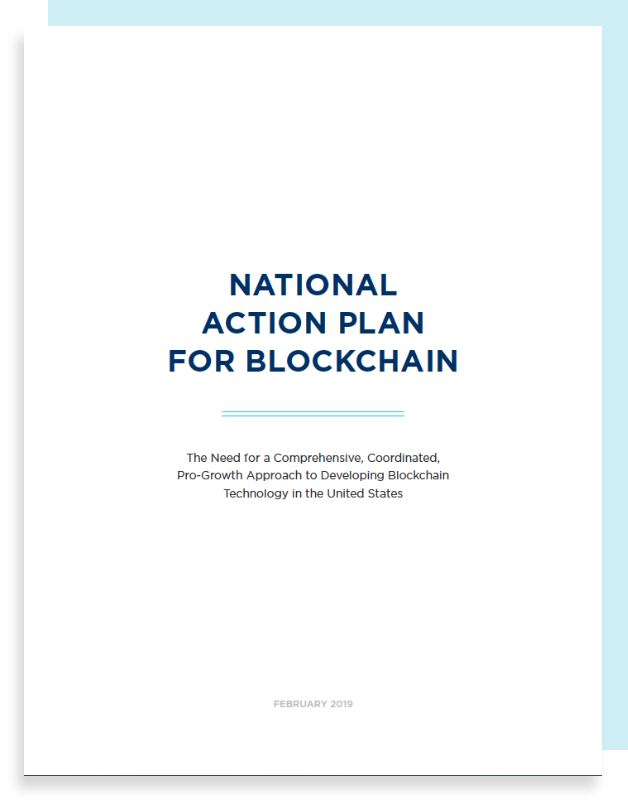Terms and Conditions
Discover Blockchain Technology
Code-A-Thon
March 6-7, 2018
The following terms (the “Rules”) apply to all participants and entries submitted in connection with the Code-A-Thon (the “Contest”), hosted by the Chamber of Digital Commerce (“Chamber”) on March 6 – 7, 2018.
Code of Conduct
All participants in the Contest must also abide by the terms and conditions set forth in the Code of Conduct (“Code”) for the Contest, which can be found at https://digitalchamberorg.local/2018-dc-blockchain-summit-code-of-conduct/, the terms and conditions of which are incorporated herein by this reference.
Participation and Eligibility
The Contest is open to the first one hundred and fifty (150) Attendees, who complete the Contest registration form described in Section 3 and who are eighteen (18) years of age or older at the time the Contest begins. Employees and interns of the Chamber and all Judges, and the immediate family members, and persons living in the same household of each, are not eligible to enter or win. Contest is void where prohibited, restricted or taxed by law. All federal, state and local laws and regulations apply. Teams may enter, but each member of a team must meet all of the above criteria.
Entry
To enter the Contest entrants must register to attend at www.eventbrite.com prior to 8am, March 6, 2018. When completing the Contest registration form, entrants will have the option to register as a team or as an individual. Each entrant is required to participate in the Contest as a member of a team and every member of each team must agree to be bound by these official rules. Teams must consist of no less than two (2) entrants and no more than five (5) entrants. Entrants without a team affiliation will be provided an opportunity to form teams during onsite registration on March 6, 2018. Entrants may change teams up until the Contest Submission (see paragraph 6). No more than one hundred and fifty (150) Attendees and thirty (30) teams will be permitted to register.
Members of a team must designate one (1) team member who will serve as the point of contact for the Contest (the “Captain”), All team members authorize the Captain to act on their behalf to complete the Contest registration form and submission forms. Each team member will be required to separately agree to the terms of these Official Rules prior to the start of the Contest.
Travel and Lodging
Each Participant is responsible for his or her own travel and accommodation arrangements and for covering all associated costs and expenses in connection with his or her participation in the Contest.
Hardware
Participants are expected to supply their own hardware for the Contest.
Contest Format
Each Team will have to complete and submit a solution for one or more of the three tracks described herein. A Contest Submission (the “Submission) should include the team (project) name, a pointer to the code repository hosted on github.com, any necessary instructions for running the same, and a brief description of what the code accomplishes and how it works. Submissions must be posted to the https://discover-blockchain-codeathon.devpost.com website prior to meeting with the judges.
In addition, each team must complete and submit an Official Team Form prior to meeting with the judges. The Official Team Form must include the name and email address of the team’s Captain, the name and email address of each individual team member and the allocation of the winnings for each team member should the team be selected as a winner. The Official Team Form will be provided to teams during the Contest. Limit one (1) Submission per team.
DO NOT SUBMIT ANY INFORMATION THAT IS CONFIDENTIAL OR PROPRIETARY OR CONTAINS A TRADE SECRET. INFORMATION SUBMITTED WILL NOT BE KEPT CONFIDENTIAL AND MAY BE USED AND DISCLOSED BY CHAMBER FOR ANY PURPOSE.
Proof of sending will not be deemed to be proof of receipt. Chamber is not responsible for lost, late, stolen, damaged, incomplete, invalid, misdirected, illegible, unintelligible, garbled, delayed, or misdirected entries, all of which will be void. In the event of a dispute over the identity of a potential winner, the winning entry will be determined by the authorized account holder of the winning entry to the https://discover-blockchain-codeathon.devpost.com website. Any potential winner may be required to provide evidence sufficient to show that he/she is the authorized account holder. A selected finalist or winner may be required to provide the Chamber with proof that he/she is an authorized representative authorized to act and acting for and on behalf of the team named in the Submission, or on behalf of each team member identified in the Submission.
On the official dates of the contest, March 6 -7, 2018, Participants must attend in-person for their work to be considered an eligible Submission.
Contest Tracks
To be considered for a prize, a Submission must relate to one or more of the following tracks:
Payments: This track concerns solutions that establish faster, more efficient, and low-cost payments.
RegTech: This track concerns back-end solutions for improving and enhancing regulatory compliance.
Digital Identity: This track concerns solutions that offer trusted, tamper-proof digital identity for consumers, businesses, and governments.
Representations and Warranties
By entering the Contest, each Participant represents, warrants and covenants as follows:
Except for sections of code that are publicly available under an open source license, participant is the sole author, creator, and owner of the code they have contributed to the team’s Submission;
The Submission is not the subject of any actual or threatened litigation or claim;
The Submission does not and will not violate or infringe upon the intellectual property rights, privacy rights, publicity rights, or other legal rights of any third party; and
The Submission does not and will not contain any harmful computer code (sometimes referred to as “malware,” “viruses,” or “worms”);
Intellectual Property: Ownership, Licensing, and Right of First Refusal
Submissions of a Team are the intellectual property of the Team and its Participants only.
The Chamber, along with the Contest sponsors, do not claim any intellectual property rights in the Submission, other than the limited rights to review the submission as part of the Contest and to publicize the Submission in connection with public relations concerning either the Summit or any future event hosted by the Chamber.
Submission Requirements
Each submission must meet the following requirements:
Functionality: A Submission may be disqualified if it fails to function as expressed in the description provided by the Participants.
Security: Submissions must be free of malware. Participant agrees that the Chamber, its affiliates, or designees may conduct testing on the product to determine whether malware or other security threats may be present. Non-compliant submissions, as determined at the sole discretion of the Chamber, will be excluded from the Contest. Further, teams and team members responsible for or associated with a submission that presents a security threat may be subject to the punitive consequences detailed in Code.
New Work: All Submissions presented to the judges must be developed at the Contest, though participants are allowed to draw from (and incorporate into their Submissions) solutions that are publicly available under an open source license.
Timely Submission: All entries must be submitted prior to 8:00 am ET on March 7, 2018.
Judges
On or about March 7, 2018 from 9:00 am to 12:00 pm ET, a panel of judges will select one (1) first prize winning team; one (1) second prize winning team; and one (1) third prize winning team. The panel of judges will evaluate each Submission and select the winners based on the following criteria:
Technical Competence and Capabilities (40%)
The Submission addresses the primary goals of the Contest with skill.
Practicality (30%)
The Submission was designed in such a way that the concept could be readily developed and potentially implemented in the real world.
Creativity (30%)
The Submission demonstrates creativity in the proposed solution and in the design elements as evidenced in the architecture of the code.
Winning selections can be chosen from any track and no track is guaranteed to produce winners. All decisions of the Judges are final and binding on all entrants.
The winning teams will be notified at a ceremony, held on or about March 7, 2018 at 1:15 pm ET at the DC Blockchain Summit 2018. For each team selected as a winner, in the event of noncompliance with these Official Rules, the selected winner forfeits the prize. For purposes of this Contest, the disqualification of Captain on behalf of the team, or of any of the individual team members, for any reason may result in the disqualification of the entire team. If a team is disqualified, or forfeits its prize, the prize will be awarded to a substitute team to be selected based on the criteria above from all remaining eligible entries.
Awards
Three (3) prizes will be awarded; one (1) prize will be awarded to the each of first, second, and third-place teams. The prizes will be as follows:
First: 1 BTC
Second: 3 ETH
Third: 50 QTUM
PRIZES ARE AWARDED “AS IS” AND WITHOUT WARRANTY OF ANY KIND, EXPRESS OR IMPLIED (INCLUDING, WITHOUT LIMITATION, ANY IMPLIED WARRANTY OF MERCHANTABILITY OR FITNESS FOR A PARTICULAR PURPOSE). Prizes may not be substituted, transferred or redeemed for cash, except by Chamber who reserves the right, in its sole discretion, to substitute a prize or portion of prize of equal or greater value. All prize details are at Chamber’s sole discretion. Incidental expenses and all other costs and expenses which are not specifically listed as part of a prize in these official rules and which may be associated with the award, acceptance, receipt, and use of all or any portion of the awarded prize are solely the responsibility of the respective prize winners. All federal, state, provincial, and local taxes associated with the receipt or use of any prize are solely the responsibility of the prize winners. The prize will be awarded according to the agreed allocation in the Official Team Form. If the members of a winning team cannot agree on an allocation, the winnings will be held in escrow until such time as there is an agreement. Any prize not claimed within 60 days is forfeited.
Disputes
This Contest is void where prohibited. This Contest is subject to all applicable federal, state, and local laws and regulations;
Neither the Chamber, its affiliates, nor its agents, are responsible for resolving any disputes between team members;
Any and all disputes, claims and causes of action arising out of or connected with this Contest, or any prizes awarded, other than those concerning the administration of the Contest or the determination of winners, shall be resolved individually, without resort to any form of class action;
Any and all disputes, claims and causes of action against the Chamber arising out of or connected with this Contest, shall be governed by the laws of the District of Columbia, without regard to its choice of law principles, and shall be resolved exclusively by the United States District Court for the District of Columbia or in the appropriate District of Columbia Court, and participants consent to the exclusive personal jurisdiction and venue of such courts as described above; and
Except where prohibited by law, as a condition of participating in this Contest, each participant agrees that any and all disputes and causes of action arising out of or connected with this Contest, or prize awarded, shall be resolved individually, without resort to any form of class action. TO THE MAXIMUM EXTENT PERMITTED BY APPLICABLE LAW, EACH PARTICIPANT HEREBY WAIVES ALL RIGHTS TO CLAIM PUNITIVE, INCIDENTAL, AND CONSEQUENTIAL DAMAGES AND ANY OTHER DAMAGES, OTHER THAN FOR ACTUAL OUT-OF-POCKET EXPENSES, AND ANY AND ALL RIGHTS TO HAVE DAMAGES MULTIPLIED OR OTHERWISE INCREASED.
WAIVERS AND RELEASES: By entering, participants agree: (a) to be bound by these official rules and the decisions of Chamber, which are final and binding; (b) to waive any right to claim ambiguity in the Contest or these official rules; (c) that they may be contacted in person, by phone, or by e-mail, with respect to the Contest; (d) that Chamber, its parent companies, affiliates, subsidiaries, divisions, and advertising and promotion agencies, and their respective officers, directors, shareholders, and employees (collectively “Releasees”) are not responsible for lost, damaged, or misplaced entries, incorrect or inaccurate transcription of entry information, or for any human or other error, technical malfunction, lost/delayed data transmission, omission, interruption, deletion, defect, line failures of any telephone network, computer equipment, software, inability to access any online service or web site, or any other error or malfunction, or any injury or damage to participant’s or any other person’s computer related to or resulting from participation in this Contest, or for any injury to person or property; and (e) that the Releasees will not be liable for losses or injuries of any kind resulting from acceptance/possession/use and/or misuse of the prize, travel to and from any prize-related activity, participation in the Contest, or printing, mailing or distribution errors. Each winner further acknowledges that Chamber does not make any warranties, express or implied, relating to the prizes and that Chamber expressly disclaims the implied warranties or merchantability and fitness for a particular use. In the event a winner/potential winner’s employer has a policy that prohibits the awarding of a prize to an employee, the prize will be forfeited and an alternate winner will be selected. Each participant hereby acknowledges and agrees that the relationship between the participant and Releasees, is not a confidential, fiduciary, or other special relationship, and that the participant’s decision to provide the participant’s Submission to Releasees for the purposes of this Contest does not place Releasees in a position that is any different from the position held by the members of the general public with regard to elements of the participant’s Submission except as specifically provided in these official rules. For each team, each individual team member and the Captain warrant that each team member has consented to be contacted by Chamber by email in connection with this Contest.
PUBLICITY: Unless prohibited by law, entry into the contest shall constitute and signify each participant’s agreement (or in the case of a team, each individual team member and the Captain permission for the Releasees to use that participant’s name, address (city and state only), and/or likeness for advertising and trade purposes without further compensation or right of review or approval, worldwide and in perpetuity, in any and all forms of media, now known and hereafter devised, including without limitation the Internet. Winners’ names, likeness, and photos and videos from the Submission may be posted online at Chamber’s website, Chamber’s social media channels, and other locations, as well as used at events Chamber may host or attend. Each winner expressly consents to these uses.
ADDITIONAL RESTRICTIONS: If for any reason the Contest is not capable of being executed as planned, or tampering, unauthorized intervention, fraud, technical failures or any other causes beyond the control of Chamber corrupt or affect the administration, security, fairness, integrity or proper conduct of this Contest, Chamber reserves the right, at its sole discretion, to disqualify any suspect entry and to cancel, terminate, modify or suspend the Contest and/or award the prizes from among all eligible, non-suspect entries received as of the date of the termination, as Chamber determines in its sole discretion. Entries not complying with these official rules are subject to disqualification.
DATA PRIVACY: Entrants agree that their personal data, including name, e-mail address, phone number, and physical address, may be processed, stored and otherwise used for the purposes and within the context of this Contest and for any of the purposes set forth in the Chamber Privacy Policy at https://digitalchamberorg.local/privacy-policy. By participating in this Contest, Entrants are agreeing to Chamber’s Privacy Policy. Without limiting the foregoing, such data may also be used by the Chamber in order to contact the Winners, check a participant’s identity and contact information, or to otherwise verify a participant’s eligibility to participate in the Contest or to receive any prize. The personal information that Chamber collects is stored and processed on servers in the United States. By participating in the Contest, participants acknowledge their personal information will be transferred to the United States.
SEVERABILITY: If any provision(s) of these official rules are held to be invalid or unenforceable, all remaining provisions hereof will remain in full force and effect.
TO RECEIVE WINNER NAMES OR OFFICIAL RULES: To request the name of the Winners (available after March 7, 2018) or a copy of these official rules, mail your request, along with a self-addressed stamped envelope to: Chamber of Digital Commerce, ATTN: DC Blockchain Summit 2018 Code-A-Thon, 1667 K St NW, Suite 640, Washington, DC 20006. Requests for a copy of these official rules received more than three months after March 7, 2018 will not be honored.
ORGANIZER: The organizer of this Contest is Chamber of Digital Commerce, 1667 K St NW, Suite 640, Washington, DC 20006







